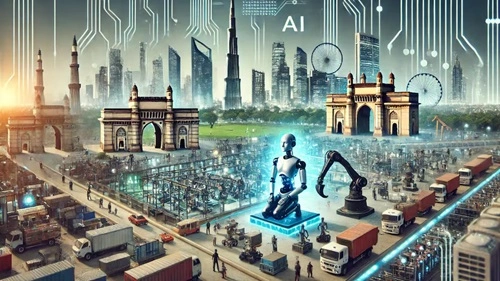The rapid advancement of artificial intelligence (AI) technologies, exemplified by tools like OpenAI’s ChatGPT and DeepSeek’s ‘R1’ model, has sparked significant discussions about the future of employment in India. In response, the Economic Survey 2024-25 emphasizes the critical need for Indian corporations to approach AI integration thoughtfully, prioritizing the augmentation of human labor rather than its replacement.
Balancing Innovation with Social Responsibility

The survey underscores the importance of building institutions that can minimize potential disruptions caused by AI while maximizing societal benefits. It calls upon the corporate sector to exhibit a high degree of social responsibility in this transformative era. The document warns, “If companies do not optimize the introduction of AI over a longer horizon and do not handle it with sensitivity, the demand for policy intervention and the demand on fiscal resources to compensate will be irresistible.” This statement highlights the necessity for businesses to implement AI with a nuanced understanding of India’s unique socio-economic landscape.
The Imperative of Skilling and Capacity Building
As the Indian AI market is projected to grow at a compound annual growth rate (CAGR) of 25-35% by 2027, concerns about employment displacement have intensified. The survey advocates for a collaborative effort among policymakers, academia, and the private sector to enhance the quality of human capital in the country. It stresses the urgency of equipping the workforce with future-ready skills, stating that AI should function as a tool tailored to specific purposes, more suited to supplement human action rather than entirely replacing it.
India’s Unique Position and Opportunity
Given its status as a service-oriented economy, India faces particular vulnerabilities to automation. However, the survey identifies a silver lining: due to the research and development nature of AI, India has the opportunity to catch up with, if not get ahead of, the curve and prepare its workforce accordingly. The document emphasizes that capacity and institution building are crucial for India to capitalize on the opportunities that lie ahead.
Global Context and Industry Insights
The global discourse on AI’s impact on employment is gaining momentum. A recent report highlighted that Indian digital news firms, including those owned by billionaires Gautam Adani and Mukesh Ambani, are preparing to challenge OpenAI over the use of their content to train AI tools like ChatGPT. This move underscores the broader concerns about AI’s role in various sectors and the importance of establishing ethical frameworks for its deployment.
Industry leaders have also voiced apprehensions about the rapid adoption of AI. Vineet Nayar, former CEO of HCL, warned that automation might lead to a decrease in the workforce size needed for specific tasks, particularly for repetitive or data entry-heavy IT jobs. He emphasized that skills related to coding, testing, and maintenance could become obsolete as AI takes over these functions.
Conclusion
The Economic Survey’s cautionary stance serves as a timely reminder for India Inc to navigate the AI revolution with care. By focusing on skilling, capacity building, and responsible AI integration, India can harness the benefits of AI while mitigating potential socio-economic challenges. The path forward requires a balanced approach that leverages technological advancements to complement and enhance human capabilities, ensuring inclusive growth and shared prosperity.

